What makes a great YouTube channel?
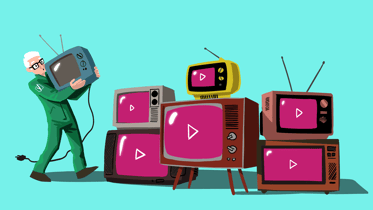
As the world’s second-biggest search engine (after Google), and the world’s second-biggest social network (after Facebook), YouTube can be an incredibly valuable marketing investment for almost every business. The key to getting a consistently high number of views is to create a channel with a compelling offering. But unfortunately, very few businesses succeed in this endeavor.
Typically, businesses tend to treat YouTube like a cupboard. A place to store all their video content and publish a disparate collection of videos under their company banner. Without wider thought given to the offering of the channel as a whole.
However, when curated thoughtfully and strategically, YouTube channels can deliver a lot of brand value for the long term. They can help you build an audience. An audience that can turn into customers and promote your products and services via word of mouth. So what distinguishes the best from the rest?
A clear value proposition for subscribers
All the best YouTube channels offer a clear and simple reason to subscribe. By the topics covered, the style of the videos, and the name of the channel itself. It should be very simple for a viewer to work out what’s in store for them if they click ‘subscribe’. If I subscribe to Marques Brownlee, I know I am getting in-depth and well-produced tech hardware reviews. If I subscribe to Jamie Oliver, I am getting quick recipes. And if I subscribe to Marie Forleo, I am getting interviews and tips around entrepreneurship.
Where most business YouTube channels fall down, is in not defining a focus for their channel beyond being a content repository. Thereby failing to offer an implicit value proposition for potential subscribers. The reason for frequent failure is that giving your YouTube channel for this requires delimiting the scope of your offering. To be clear about the kind of content you are creating, across which topics. And to be strict about keeping to that scope. This requirement doesn’t sit well with most businesses. Because they (incorrectly) typically think all the videos they make have to be on YouTube.
While YouTube is the biggest video platform in the world, video is bigger than YouTube. Not all your videos need to be on there. Videos that only really make sense to existing customers, or when viewed in the context of a specific web page, are best kept exclusively on your website and hosted on a different platform.
YouTube channels work best when the content is exclusively focused on a certain idea or theme, bigger than the business. “Subscribe to our YouTube channel because it is our company’s channel” is not a strong value proposition. “Subscribe to our YouTube channel because you’ll receive the best content on X topic in an enjoyable format” is. So, the first thing to do in order to build a great YouTube channel is to define your value proposition. What are you creating? Who are you creating it for? The more specific, concrete, and focused you can be in answer to these questions – the better!
All killer content and no filler
The best YouTube Channels are lean and mean, without superfluous or low-quality content. Not only does this mean ensuring everything that you publish on YouTube is consistently meeting a high creative standard. It also means ensuring everything on the channel is contextually relevant for a new user discovering your channel without prior knowledge of your brand or products.
This means removing esoteric product or sales videos and ensuring everything on the channel provides value to the average user interested in your area of focus. Regularly audit your YouTube channel to see which content has been performing poorly. Remove those lower-quality videos so that users exploring your content library will always find your best work.
As a general rule, any videos that have lower than 30% average retention, or those videos getting relatively few views from YouTube search and suggested videos are the ones that you might want to think about removing.
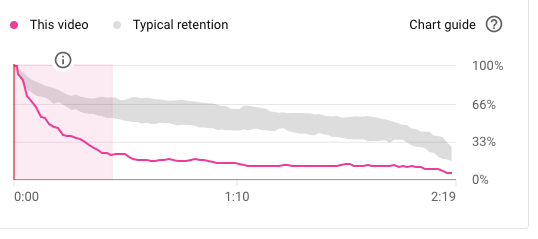
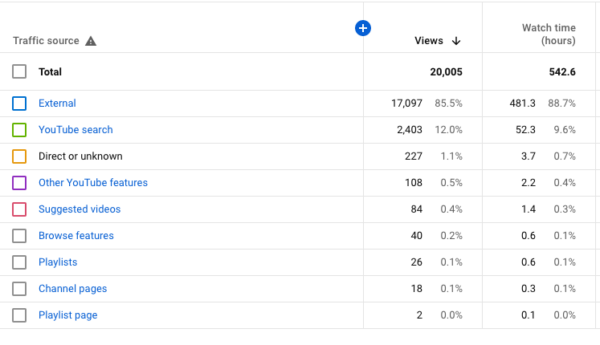
The data can be helpful to guide your curation. However, a strong editorial perspective is the clearest guide as to which videos should remain on the channel and which shouldn’t. If it’s quality, valuable content that appears to be resonating, keep it! If it doesn’t seem to be generating many high-quality views and interactions, it’s probably better to remove it.
Featured sections on the home page
When you arrive on a YouTube channel for the first time, you’ll typically browse the home page. This is where you expect to see videos organized into playlists, based on either media type or topic. YouTube allows you to include 12 “Featured sections” which can be playlists, other channels, subscription links and live streams.
Playlists should allow you to watch episodes from an episodic series in order. They should allow you to go through all of the content of a certain media type (e.g. interviews, demos). And you should be able to understand the essence of what the channel has to offer at first glance.
Your YouTube channel homepage is like a storefront for your YouTube videos. Put the best stuff on display, and make it easy for people to get around!
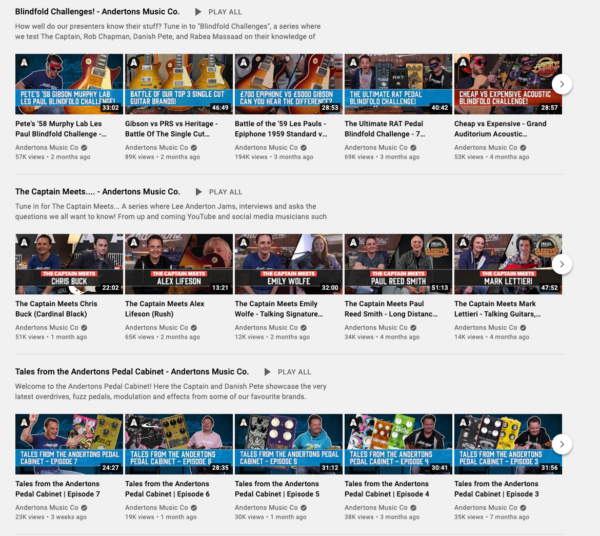
A channel trailer and a featured video
YouTube allows you to set a “Video spotlight” on your Channel homepage. Which changes depending on whether the user arriving on your homepage is already a subscriber.

When a subscriber arrives, they can be presented with one of your best videos. But when a new audience member arrives, they can be presented with a channel trailer. A video that gives a flavor of the kind of content being created and the channel value proposition.
It’s well worth your time investing in creating a channel trailer. Something only a minute or two long that includes clips from your best content, and uses a voice-over or talking head to explain what you’re offering and why new people should subscribe.
Beautifully designed and consistent thumbnails
Thumbnails are one of the most important parts so the infrastructure on YouTube. The most critical mistake many businesses make is just using the default options provided by YouTube when uploading a video. Don’t rely on automatically selected frames from the video. Create and upload custom thumbnails that allow you to bring an element of consistency and brand identity to each video, while also attracting more clicks.
Moreso than the video title, the video thumbnail is the creative element that impacts click-through rate across search and suggested videos. It is, therefore, something you should spend a lot of time refining and optimizing. The best channels have a level of consistency in the thumbnails across their videos. Such that you can usually tell that the video is from their channel even before you see the channel icon below the thumbnail.
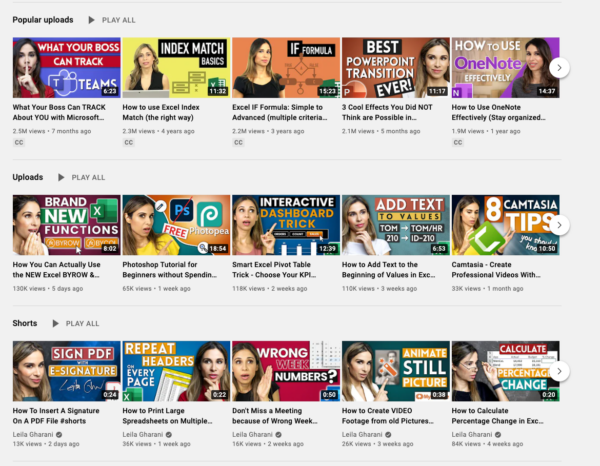
Many channels find that having an expressive human face in the image, if appropriate, helps improve click-through rates.
Click-worthy titles
The best channels also carefully consider and optimize their titles, with more of an editorial lens than an SEO lens. Titles need to attract clicks more than indicate keyword relevancy, and should always be written with this goal in mind.
YouTube video titles work best when they entice the reader with a clear promise. They should also provide additional context when paired with the thumbnail. They should provide an emotional promise, indicating a reaction one is likely to feel once watching the video. One common way to achieve this is by past-participle verbs like impressed, surprised, worried, shocked, amused etc.
Unlike page titles on websites, YouTube titles don’t benefit in any way from having the brand name and content type included after a pipe or dash at the end of the title. They are usually best staying under 50 characters so as not to be regularly truncated. Keep them snappy, and accurately find a way to hint that the video will be worth the reader’s time.
Content to meet search demand
There are many ways to work out what sort of content to create for YouTube. But the best channels make sure they are creating content to capture the latent demand out there expressed through search. You want to make sure that when anyone searches for terms around your chosen areas of focus, that your videos are ranking well. On both Google and YouTube search.
This typically isn’t achieved by optimizing the meta elements of existing content, such as adding YouTube tags. Rather by creating content specifically to match the intent expressed through search. If you’d like to know how to do keyword research for YouTube, and what people search for in your niche, check out this post on YouTube keyword research.
Content to keep audiences coming back
A great YouTube channel can’t grow only by relying on new users. You need to ensure that your existing audience subscribes and keeps coming back to watch more content.
This means coming good on the promise of your channel value proposition. It means regularly publishing content that entertains and informs your subscribers. As a rule of thumb, you’ll need to be publishing new videos at least once per week. Make sure to keep an eye on what’s working, and what’s falling flat. This helps you adapt your creative strategy to ensure you get more hits than failures over the long term.
Remember that building a great YouTube channel takes time. You need to be prepared to commit for the long haul if you want to see meaningful returns. In most cases, I would expect it to take a year or two of regular quality publishing for any channel to really gain traction. So strap in and enjoy the ride! And if you want to know more about video SEO, you can check out the podcast I did with Joost de Valk on improving your online video strategy.
Read more: YouTube SEO: How to use analytics for your video strategy »

Discussion (6)